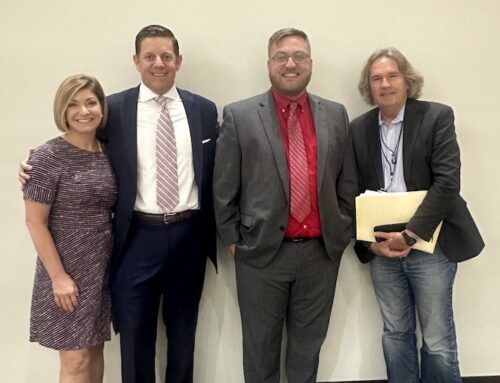The problem with the court’s witch hunt over the leak of police records in Covenant case
It’s been a dizzying week in the public records case before Davidson County Chancellor I’Ashea Myles.
For more than a year now, Myles has been considering whether the public records law requires the Nashville Police Department to release files from its investigation into the Covenant School shooting. Six people were killed in the shooting, including three children.
Now, however, as everyone has been awaiting a long-overdue ruling, the chancellor has turned her attention to a leak of police records to a local conservative news website, The Tennessee Star. She is clearly hot about it.
On Monday, she ordered Tennessee Star Editor Michael Patrick Leahy, the editor and owner of Star News Digital Media, one of the four plaintiffs in the case, to appear personally in court on June 17 and show in a “show cause hearing” why his “publication” of articles based on leaked documents “does not” subject him to contempt proceedings and sanctions.
Today, a Nashville police lieutenant delivered a declaration to the court suggesting the leaker is former lieutenant Garet Davidson, who also just happened to file a big complaint against his former employer.
The problem with the court’s witch hunt is that truthful information about the Covenant shooting is being reported to the public from records that should already be public and that the public has a right to know.
But instead of focusing on fairly upholding the public records law and making a ruling expeditiously, the chancellor is now focused on finding and punishing the “leaker” and possibly a conservative press organization that published the material.
Her attention and energy is misguided. In my view, the chancellor’s job is to decide whether the public records law requires the police department to disclose records. Nothing else. Her job is not to assert control over a news organization’s news gathering. And it’s certainly not to threaten the press with contempt proceedings for writing about the Covenant case and publishing lawfully obtained and truthful information that, in this instance, is clearly in the public interest.
Timeline of the court’s orders about leaked police documents
Here is a timeline as I know it so far:
Feb. 13, 2024 – Myles issues an order that says “any supplemental filings, declarations, and/or affidavits filed by the Parties and/or Amici or sought to be filed by the Parties and/or Amici containing any direct information, no matter how obtained, which is the subject matter of this case SHALL NOT be filed with the Court but SHALL BE submitted for in camera review following the procedures delineated in this case. … Any efforts to usurp the Orders of the Court by any Party, Counsel and/or Amici regarding the matters currently under in camera review shall be sanctioned to the fullest extent of the law, including contempt of court.”
Feb. 25, 2024 – Myles issues a followup order, explaining more about her Feb. 13 order. She said that some police documents had been “illegally leaked to the media from a source with direct contact with the files at the scene of the incident.” [Note: This followed conservative media commentator Stephen Crowder’s publication of pictures of the shooter’s writings found by police in her car.]
“The Court is concerned that the filing of such leaked documents into the record of the Court will violate the due process of this Court proceeding and the parties involved. Further, the Court is concerned that the filing of such leaked information in the record of the Court may encourage the additional illegal leakage of documents by anyone who may have access to those documents and would wish to influence the outcome of these proceedings, usurp the rule of law and/or circumvent the legal process.”
She mentioned documents that were “illegally leaked” and filed by one of the petitioners, Clata Renee Brewer, and have been placed for in camera review. Not only may no copies of leaked documents be filed with the court, “(n)o party shall directly quote or reproduce the contents of any such document in its briefing or argument.”
(Note: It is not clear to this writer how someone “leaking” these documents was “illegal,” a word Myles uses. The district attorney has not sought to prosecute anyone, as far as I know, and police don’t appear to have pressed any charges either. I know of no statute that makes releasing this type of record illegal, although certainly theft of police records could be illegal. But what about taking pictures of police records, would that be theft? Also, I am uncertain that Chancellor Myles has the authority to issue an order to prevent the police department from releasing its own documents, and I don’t recall an order to this effect anyway. It would seem like a bad idea allowing a judge to prevent another branch of government from releasing its own records that it wants to release. A simple exemption to the public records law doesn’t make releasing records illegal. However, we might found out soon how far this freshman judge believes her authority extends. She does seem concerned with the due process rights of the Covenant parents, school and church, who she allowed to intervene in the case. They want to prevent release of most, if not all, of the police records into the investigation, especially the writings of the shooter.
June 4, 2024 – The Tennessee Star begins publishing stories using information from an interview with the former police lieutenant Davidson, unnamed sources and the shooter’s writings found in her car.
Some revelations from the more than 30 stories: The FBI suggested that Metro Police could destroy the shooter’s writings to prevent the public from ever seeing them; a psychologist who treated shooter Audrey Hale tried to get her involuntarily committed at the Vanderbilt psychiatric hospital after Hale expressed violent fantasies; Hale had been planning the attack for a very long time and thought she could have been discovered; and Hale had been treated over the course of 22 years by Vanderbilt Psychiatric. (Hale was 28 years old when she attacked the school and was killed by responding police.)
Monday, June 10, 2024 – Chancellor Myles receives a media call requesting comment or a statement regarding The Tennessee Star’s stories. The call was from WSMV reporter Stacey Cameron, according to the news station’s own reporting.
Monday, June 10, 2024 – Chancellor Myles orders Leahy to appear “in his individual capacity” on Monday, June 17, in her court. The hearing is “to determine why the alleged publication of certain purported documents by Petitioners Star Digital Media and Michael Leahy, as the Editor-in-Chief, does not violate the Orders of this Court subjecting them to contempt proceedings and sanctions.”
Wednesday, June 12, 204 – Daniel A. Horwitz, a First Amendment lawyer in Nashville hired by Leahy, files an emergency motion for Myles to set aside the June 10 order for the show cause hearing.
“With due respect to the Court, this Court’s show cause order: (1) violates Tenn. Code Ann. § 24-1-208(a), Tennessee’s shield law; (2) contravenes Tennessee’s contempt law; (3) deprives Mr. Leahy of minimum due process guarantees; and (4) suffers from other serious constitutional infirmities.”
Horwitz said it was not clear what order or provisions of the judge’s orders Leahy violated because the judge wasn’t specific in setting the show cause hearing. The orders appear to be about supplemental filings and declarations in court. How could Leahy defend himself if he didn’t know what the court thought he did wrong?
Horwitz also outlined for the judge the protections in the First Amendment to the U.S. Constitution that provide for press freedom and prohibit prior restraint by government, including courts, on publishing material. If the judge thought her order prohibited Leahy from publishing, that would be prior restraint and unconstitutional, he argued. Horwitz said he would file an emergency appeal to the Court of Appeals if she did not vacate the show cause hearing order by noon Thursday.
Thursday, June 13 – Horwitz files an emergency application with the Court of Appeals to stay Chancellor’s Myles order.
Thursday, June 13 – Sometime after Horwitz files his appeal, or maybe near the same time, Chancellor Myles issues a new order, refusing to rescind her order for the show cause hearing and adding new information about what she wants at the hearing on Monday. She extends the order to require that a representative with Nashville government to appear. And she says that Horwitz’s claim of a First Amendment problem was premature because the Monday hearing is not a contempt proceeding.
Myles also announces in her order that if she determines a “leak did in fact occur by any party to this case and that such action was in violation of the Orders of this Court, or that there has been any abuse of, or unlawful interference with, the process or proceedings of the Court, or any violation as set forth in Tennessee Code Annotated §29-9-102, this Court may then enter an order and notice appointing an attorney as amicus curiae to the court for investigative purposes, and to initiate and prosecute a contempt citation.”
(Note: I did not know the court could appoint an “amicus curiae” to investigate and prosecute contempt citation, but as the judge notes in her order, the authority of a trial court like hers “is quite broad.”)
Thursday night, June 13 – Sometime after 8 p.m., another order is entered by the court announcing there will be no live testimony at the Monday hearing.
Friday morning, June 14 – Metro Nashville submits a declaration from Lt. Alfredo Arevolo that suggests former Lt. Garet Davidson is the leaker — or at least points out he had access to the entire file. Davidson was interviewed by Leahy on the record about the Covenant case. Leahy has not revealed the source of the photos of the writings found in the car. Davidson left the police department in December 2023 or January 2024 (it’s been reported two ways). He had worked in the Office of Professional Accountability and had access to the entire criminal investigative file during an investigation into an earlier leak of documents, Arevolo said
Davidson, by the way, filed a 61-page complaint against the Nashville Police after he left, which was widely reported on in the news media.
CURRENT STATUS: At this point, the original show cause order remains in effect, requiring Leahy to appear at the Monday hearing and presumably – perhaps now through attorneys and not live testimony – show why his publication of information from leaked documents does not subject him to contempt proceedings and sanctions. It also seems clear that the judge is on the hunt for the leaker and wants to do something. What that something is, we’ll just have to wait. The Court of Appeals had not responded as of 11 a.m. to Leahy’s motion.
What’s supposed to happen in a public records case
If this case ends up being about the court punishing the press or even a leaker, it will have gone far beyond where it started.
The Tennessee Public Records Act allows a requester whose public records request was denied by a government entity “to petition for access to any such record and to obtain judicial review of the actions taken to deny the access.”[(T.C.A. § 10-7-505 (a)]
“The burden of proof for justification of nondisclosure of records sought shall be upon the official and/or designee of the official of those records and the justification for the nondisclosure must be shown by a preponderance of the evidence.” [T.C.A. § 10-7-505 (c)]
“The court, in ruling upon the petition of any party proceeding hereunder, shall render written findings of fact and conclusions of law and shall be empowered to exercise full injunctive remedies and relief to secure the purposes and intentions of this section, and this section shall be broadly construed so as to give the fullest possible public access to public records.” [T.C.A. 10-7-505 (d)]
We seemed to have strayed so far away from this statute in the past year.
Deborah Fisher is executive director of the Tennessee Coalition for Open Government. She was previously a journalist for 25 years at newspapers in Texas and Tennessee.





